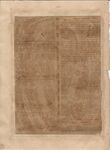 |
vol. title: vol. period: 1876-1878 pages in vol.: 247 There is a handwriting note in unrecognized language. |
< The Views of the Theosophists (continued from page 4-137) >
the spiritual side of the universe; that the elementaries all finally become purified of sin.” Partly so. Pure spirits—judged by human standards—do deny that comprehensive doctrine of annihilation; they do say that few fail of final progress, though some do. So far as I know they affirm the doctrine of evolution, and impress on man the doctrine that he is the arbiter of his own destiny, that his evolution will be slow or rapid according as he works out his own salvation. The Gospel they proclaim seems to me to be one that needs no advocacy. Man, they say, makes his future, and is the arbiter of his own fate. He graves day by day a character which is permanent, and by virtue of it he goes to “his own place.” He works out his own salvation, and after his physical life is done with, he remedies often in sorrow and shame, the defalcations and sins of his life, and pays the penalty of his transgressions. Helps he has, and by their means he is led upward. But if, by a course of preferred vice, by ingrained preference for the “earthly, sensual, devilish” he chooses evil and refuses good, then, by the action of the same invincible law, he sinks lower and lower, till beyond hope. But these cases are few and far between.
But, says Col. Olcott, “who cares to offset the asseverations of such unverified and unverifiable witnesses against the accumulated experience of thousands of trained seers, not mediums, not controlled, but able to sound the profoundest depths of nature, and who have sounded it?”
Well, that is just one of the statements so freely made. Where are the seers? what are their records? and (far more important) how do they verify them to us? As to the unverifiable nature of statements made by spirits, admitting (for the sake of argument only) that such is the case, do not the spirit and the seer sail in the same boat? The spirit at any rate is in evidence; the seer as yet is not. We cannot fairly be expected to u find in the far East the proof” we ask for. We must at least have some ground for believing that all the wise men do come from that quarter.
Another curious statement, made as if it were perfectly familiar, is this—at birth a babe is but a duality, and becomes a trinity only when reason begins to manifest itself, usually at the age of seven years, but sometimes earlier.” This at any rate is new to me, and should be substantiated by some evidence. Shall I be wrong in saying that where Theosophy touches ground we have no difficulty in recognizing its beauty? We admit with all frankness that Spiritualism in some or many of its exoteric aspects is unlovely and of bad repute. We welcome the effort of the Theosophists to tell us how to remedy the blemishes which we have already seen, and which our “pure disembodied spirits” are never weary of dilating upon; and for which they also prescribe a plain remedy. In the midst of perplexities that beset us we are grateful to them for pointing out the sources of our bewilderment. But we would represent to them that they only increase our difficulty by the suggestion of unproven hypotheses. We want some rest for the sole of our foot, but we do not find it in rhetoric, or in supposition, or in mazes of hypothetical deduction. Before any hypothesis can seriously demand our attention it must either grow from previously ascertained fact as a deduction, or it must be an attempt to explain on a reasonable basis all observed facts of a particular class. It is here that we Spiritualists part company with Theosophists. We say that they import into the discussion a number of hypotheses and theories of which they offer us no proof. We say further that they do not make sufficient account of much evidence that we produce. And we say further still that, so far as their claims are proven or even vraisemblable, they are in no way incompatible with the truest Spiritualism which thus, as the greater, includes the less.
London, January 7th.
A Strange Visitation
...

Editor's notes
- ↑ A Strange Visitation by Gomes E.A., Spiritualist, The, Jan. 11,1878